“At any kind of transition point in our lives we all need the certainty of knowing at some level that we are securely held. This is the ground from which we leap, however near or far, and to which we can return and be welcomed back.” – Wisdom of the Body Moving, by Linda Hartley.
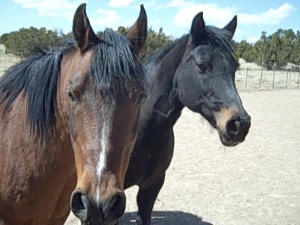 Although this is a truth applied to bodywork, and the student/practitioner/instructor relationship for humans, it is also true of us as instructors of horse training. With Liberty Foundations, we are creating a place where the horse feels supported and “held,” so that she can leap forward into whatever endeavor she may be destined for.
Although this is a truth applied to bodywork, and the student/practitioner/instructor relationship for humans, it is also true of us as instructors of horse training. With Liberty Foundations, we are creating a place where the horse feels supported and “held,” so that she can leap forward into whatever endeavor she may be destined for.
This is where new learning takes place – where there can be a recognition of self and other that then can move outward to recognize the greater whole. This is how we create a caretaking horse.
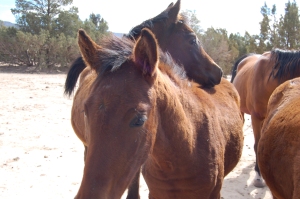
I’ve had several experiences with caretaking horses, but they all stem from how those horses have felt supported from the very beginning.
I use two of my horses as what I consider a “perfect” example of caretaking horses.
After I suffered a pelvic fracture and was walking on crutches, my horses decided how to care for me. Zuzka, my black mare, was a little nervous about the crutches, but when I sat down in the corral and placed them beside my chair, she came and stood over me and breathed, as though I were her foal.
When it was time for me to get back in the saddle, my gelding Khami came forward and offered himself as my riding horse. He is a playful horse by nature but in this situation he put all his shenanigans aside in order to help me get back to riding. At first, I could only sit in the saddle for about five minutes, then the length of time grew. Once we were back out on the trail, he walked slowly and decided when I was ready to trot. He treated me with utmost care.
Those horses who have not been valued highly and whose thoughts and desires have been ignored will have a harder time forming the caretaking bond. Most who have gone through “rough times” but who had good beginnings, will retain that caretaking quality. That quality is what we see in dams and their foals. By nurturing those qualities, dams model the type of behavior we seek in a mature horse.
Sometimes that doesn’t work, however, and a dam will reject her foal, but that is the way of life in some circumstances. What can happen in a herd, is that other mares will take over the raising of the foal and that foal will not suffer lack of caretaking.
Horses who are forcibly removed from their dams before weaning in brutal roundups by the BLM and other situations are most
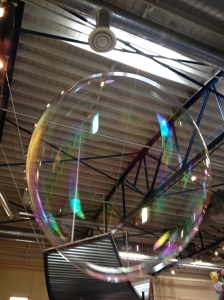
likely missing some essential nurturing which can be restored by the Liberty Foundations, as well as by a human or horse herd. They will then be able to bond on many levels if they get this modeling behavior. If they never get it, they may turn out to be aloof and not connect deeply with anyone – horse or human.
When we need to build natural horse behavior and relationship back into a horse who is lacking this, the Liberty Foundations are a great way to go. The horse will gain comfort from the movement, rhythms and patterns of other horses. That’s why it’s important for us humans to learn those rhythms so that we can be part of the teaching herd.
As part of building the relationship, the visualized bubble protects you and your horse from what happens around you. Horses will flee at the sound of a loud truck, or the fear of another horse or herd of horses, or anything that scares them. If you’re on their back or in close proximity, that may not be the response you’re looking for. Visualize an energetic bubble containing you and your horse, and it’s less likely your horse will want to flee. She will stay connected to you as long as you aren’t a bundle of nerves at the time.
When something frightening happens around me and my horse when we’re together, I do this. And I also make sure I’m breathing and not stiffening up different parts of my body. I need to be a place of safety for my horse, a caretaker, so that she in turn may model that and become a caretaker too. Her former modeling will come in handy, but in the current situation she is relying on me to not flip out as well as with past experiences.
Once you have formed this ability to protect your horse in a true way, your horse will protect you. I believe my two horses were there to protect me when I was weak and needed help, because they had felt supported by me both physically and energetically. Support radiates out from first encounter, a dam and her foal, to other areas of support, which include moving the foal off food, protecting the baby from predators, until the foal is ready to go out in the world and practice what she has learned with other horses and people.
This is how good support works with human families and it’s how we can be involved in horse families as well, building stronger caretaking capabilities in our horse families as we work to establish the ground from which we — and our horses – can leap and return to for comfort.
****
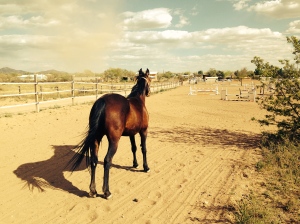
(copyright: Susan Smith, OrthoHorse)
Services: Bodywork (Ortho-Bionomy for people, Equine Ortho-Bionomy): private sessions, tutorials, phone consultations, distance healing communication and gift certificates
Some Don’t Like it Hot – These Liberty Coaching clinics will take place in the cooler morning hours over the summer. If you want to host a clinic in your area, contact me to make arrangements. Prices will vary according to location and travel. susansmith@orthohorse.info 505-501-2478
Liberty Coaching: clinics, mini-clinics, workshops, private and semi-private sessions, tutorials, consultations: by appointment: 505.501.2478 or emailing susansmith@orthohorse.info Scheduling now. Contact me for details.
July 2 & July 23: First Horses at Liberty Foundations Online course. In this class, comprised of two calls complete with lessons, you will learn the fundamentals of how to work with a horse at liberty, inspired by herd behavior. The way that horses interact with each other maintains cooperative relationships, safety and survival. No restraints are used – the horse becomes a willing participant. Contact me if interested. Cost $150. A second segment of the class will be scheduled for August. I conducted a free Liberty Coaching Call on March 12. If you did not have a chance to listen, here is the link: http://www.susith.com/orthohorse/freehorseatlibcall.mp3
Sunday, July 27: Trail Riding Class in Cerrillos. Learn how to apply some Liberty Foundations to your trail riding experience for a safer, more connected ride, what I call the “centaur relationship” with your horse. The class will involve some ground, dimensional and saddle work, and a short trail ride. This clinic will fill up fast so let me know if you want to participate.
Combining cumulative knowledge from over 18 years of endurance riding, Liberty Horsemanship and Ortho-Bionomy bodywork practice, Susan Smith brings a unique perspective to getting a horse and rider ready for the trail – in mind, body and spirit.
September 27-28 – Spirit Horse Ranch Two-Day Liberty Foundations Clinic, Oklahoma City, Oklahoma – Engaging the Hearts and Minds of Horses. Susan Smith and Ruella Yates, co-teaching. Contact me or Ruella at 405-771-4274 (ruella@libertyfoundations.com)
December 13-14 – Horses at Liberty Weekend Clinic, DeLand, Florida – Bring your Horse into Deep Working Connection with Liberty Horsemanship. Instructor: Susan Smith. Contact Anne Daimler tdaimler@cfl.rr.com (386-822-4564) Susan at susansmith@orthohorse.info (505-983-2128 or cell 505-501-2478) 9:00-4:30 p.m.
Susan is a member of the Independent Liberty Trainers Network. libertytrainersnetwork.com/



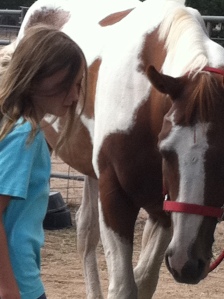
We’ve seen this happen in our Liberty Foundations clinics! And now it is happening in online classes, too. Thanks for this, Susan.
Ruella Yates
Liberty Foundations @ Spirit Horse Ranch
Yes, the work goes beyond the making of a riding horse, to one who will look out for your best interests and stay close to your heart.
Yes… I believe in the caretaking of us by our horses. I have experienced this “profoundly” with my horse when I “NEEDED” his support.. he gave it ten fold!!!!!
Thanks for writing, Rosalie! So glad to hear of your experience with your caretaking horse.
I got Regalo when I was 4 months from one hip replacement and then he was with me through the second one in less than a year. Regalo would not let me catch or halter him, so I sat with him for 30 straight days (hour at a day). When I could halter him and walked him around the barn area, I drug a white plastic lawn chair around and he walked very slow with me. Today 2 years after both hips were done, we walk around the barn area and I can’t keep up with him. I just realized that he was doing it for me (walking slow)
Glorya, that kind of sensitivity that Regalo shows you when you need it is so amazing. And now that you are healed from the hip replacements, he’s marching around the barn…